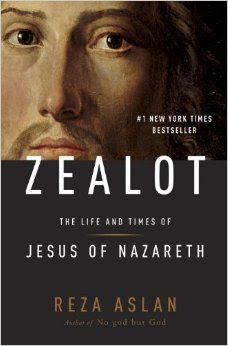 |
| Amazon |
 |
The Christians, too, felt the need to distance themselves from the revolutionary zeal that had led to the sacking of Jerusalem, not only because it allowed the early church to ward off the wrath of a deeply vengeful Rome, but also because, with the Jewish religion having become pariah, the Romans had become the primary target of the church’s evangelism. Thus began the long process of transforming Jesus from a revolutionary Jewish nationalist into a peaceful spiritual leader with no interest in any earthly matter."
After the jump, my review.
Grade: B+
Reza Aslan's Jesus is the "revolutionary zealot who walked across Galilee gathering an army of disciples with the goal of establishing the Kingdom of God on earth." It is Aslan's contention that this Jesus of history has been replaced by Paul's creation, Jesus the Christ. By the time Paul is done with him, Jesus's mission to the Jews is abandoned, Jesus morphs into God incarnate and Christianity is transformed into a Romanized religion with no practices of Judaism remaining.
Aslan details how that transformation came about, from the epistles of Paul, which were written before the later gospels of Mark, Matthew, Luke and John, but heavily influenced them, especially as one evolved to the next over many decades after Jesus's death; to the Nicene Creed agreed upon three centuries later at the command of the Roman emperor; to the final consensus of what books would make up the New Testament, more than half of which ended up either by or about Paul.
Aslan details how James, Peter, and John, the successors of Jesus in Jerusalem, didn't like what Paul was preaching, recalling him to Jerusalem twice and sending other missionaries to follow Paul in his travels with a message more compatible with what Jesus himself preached. But the Roman converts were amenable to Paul's message and, slowly, Paul -- and Rome -- won out.
Critics have had a field day with Aslan. They've attacked his own religion, his academic credentials, his facts, his interpretation of Scripture, and his decision to focus on the Jesus of history, not Jesus the Christ. Whether Aslan gets facts wrong is a matter I don't have the expertise to judge. But his decision to study the historical context of Jesus the Christ is something all should be open to, even if they disagree with his conclusions.
Here are some "facts" or at least interpretations of Scripture that have caused controversy with believers. Aslan doesn't explicitly deny Jesus's miracles, but says that miracle-workers were common in first century Palestine. What makes Jesus stand out, Aslan says, was that he didn't ask for money to perform them, unlike the high priests in the temple. Aslan doesn't explicitly deny Jesus's own resurrection, either, but declares that it "falls outside history and into the realm of faith." He does point out a side benefit of the resurrection story for early Christians: it "solves an insurmountable problem, one that would have been impossible for the disciples to ignore: Jesus's crucifixion invalidates his claim to be the messiah and successor to David." But Aslan does explicitly deny other Gospel stories as being entirely incompatible with known practices in first century Palestine.
Obviously, Christians have another interpretation for all this, that Jesus was indeed God incarnate. He didn't become man to become King of the Jews and restore the Kingdom of David. He became man to die for our sins. Aslan is not going to change Christian's minds about this. If you take Aslan at his word, that's not his goal. It's to tell of his own great respect for the Jesus of history that he feels has been overlooked:
"Today, I can confidently say that two decades of rigorous academic research into the origins of Christianity has made me a more genuinely committed disciple of Jesus of Nazareth than I ever was of Jesus Christ. My hope with this book is to spread the good news of the Jesus of history with the same fervor that I once applied to spreading the story of the Christ."
The ebook in Kindle format is available for free from the Richardson Public Library.

No comments:
Post a Comment
Keep it courteous, clean, and on topic.
Include your name.
Anonymous commenters are unwelcome.